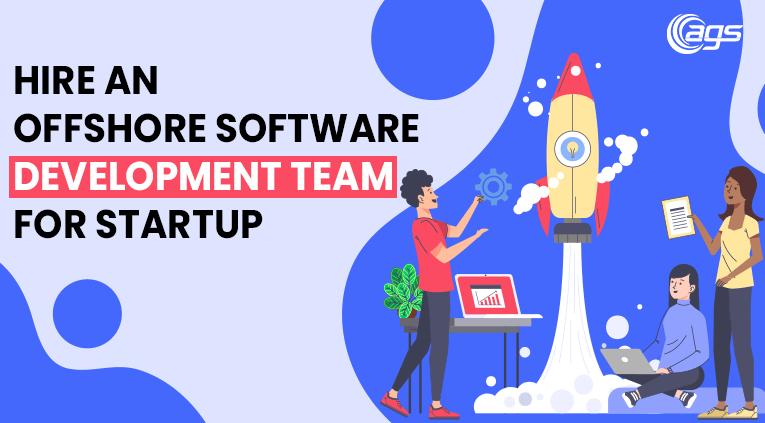You must have heard the term API thousands of times. It stands for Application Programming Interface. We all know that the internet is full of APIs and it has come to stay, but do we really understand what an API truly is?
An API is a set of requirements or functions that allows two applications to communicate with each other. The primary goal of this communication between applications is to exchange data so they can work symbiotically. The Software Development Life Cycle (SDLC) doesn’t necessarily need APIs, but they are usually used when there’s a lot of complexity and heterogeneity in the system at hand.
The use cases of APIs are very diverse so it is difficult to provide a comprehensive guide. But in the following sections, we’ll try to touch on most of the topics you may come across when developing an API for your business. In this particular guide, we’re explaining every aspect of API including how APIs work, top companies using APIs, types of APIs, monetizations, how to develop APIs, and much more.
Companies using APIs
Let’s have a look at how different businesses are using APIs to handle their large database.

This social media giant uses APIs to feed the data of millions of accounts into third-party applications. Each tweet can be published only by authenticated users.
For example, if you are using the Twitter API to publish tweets on your third-party app, it must be done by users who have approved access.
Another popular social media platform, Facebook allows people to share content with friends and family and also exchange messages via WhatsApp and Instagram. All of these features allow developers to use Facebook’s APIs to integrate their own services into Facebook.
Amazon
You might already be aware that Amazon has one of the largest e-commerce sites in the world. Many developers have customized apps and websites using Amazon APIs so they can sell their products on Amazon or advertise them on other platforms.
MailChimp
The most popular email marketing service in the world allows developers to integrate their services with MailChimp. This integration is done via APIs by sending campaign information like subscriber list, subject line, content, and other details related to an email campaign.
Why are APIs important for business?
If there are no APIs present in the development ecosystem, mobile application development will become highly time-consuming. Some key advantages of using APIs in growing businesses are:
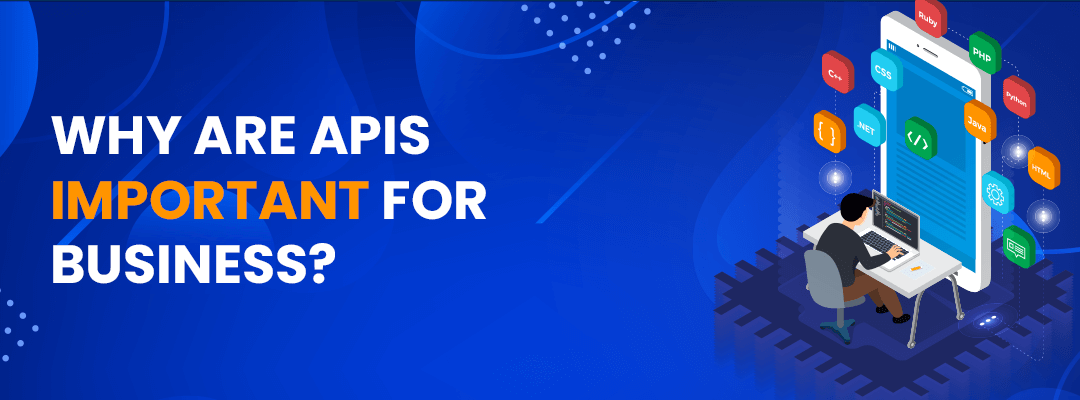
1. New technology support
APIs are the easiest way to make your business compatible with new technologies. There are various APIs available in the market that supports different kinds of features. The business development team can use them to add new functionalities whenever needed.
2. Fast response time
Most websites and mobile apps rely on third-party APIs for their functionality. If you’re using an application on your phone, it will ultimately rely on one or more APIs provided by ISPs, operating system providers, or some other company’s servers.
This is why the users expect quick responses when they click on buttons or links on any app because these requests pass through several layers of software before reaching the intended destination which includes database queries, backend computations, web services, caching systems, and so on.
3. Cost-effective
APIs are cost-effective for the following reasons:
- As you don’t need to hire extra resources or purchase new software licenses, there is no upfront cost associated with APIs.
- The company’s IT team will be able to work more efficiently by using third-party APIs for some parts of their applications.
- APIs provide a faster and better user experience.
API Monetization
As API is a digital asset, you can monetize it and create a passive source of income. There are several ways to make money using APIs.

1. Sell API access
Some companies share their APIs with other businesses or developers who can sell these services back to end-users of their apps and websites. In return, you get a share of the revenue generated by API usage of those applications.
2. Monetize analytics
Due to the high degree of customization that is allowed in terms of API functionalities, it becomes easier for business owners to delve into customer behavior data and draw valuable insights from them.
They can then monetize this information through different models like selling the data as a package, an API call, a database query, etc.
3. Scripts
Small snippets of code written for specific tasks can also be monetized using APIs. Some of the common tasks include automating tedious tasks like building, uploading, testing, deploying code, etc.
4. API documentation
Another good way to make money is by making your API easy to use and understand for developers so they can integrate it quickly with their applications.
Build a valuable community around your API and have a free trial period in place so that you can attract more customers who would then pay for access to your complete API offering.
Different types of APIs
On a broader level, there are five types of APIs that are majorly used in the development:
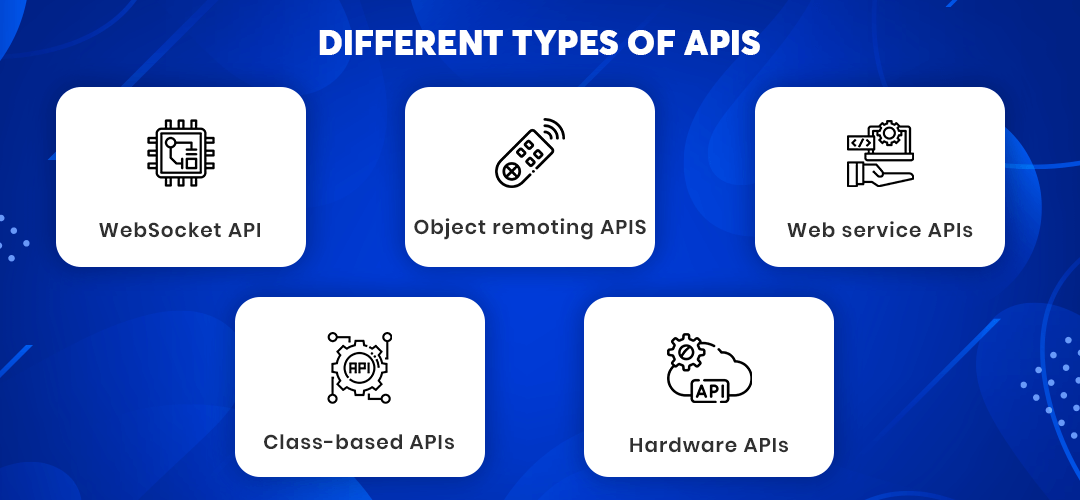
Along with these, there are four more types of APIs that are:
1. Composite API
When two or more APIs are combined, then it’s called composite API. Developers use these composite APIs to create a series of combined or individual operations.
2. Partner API
Partner API is an API that is created by a third party for use by another company. These are majorly used in business-to-business activities.
Only authorized users only access and use these partner APIs. Partner APIs are more secure, intact, and exclusive to use among certain organizations.
3. Public API
Public API is an open-source one that is available for free. These are mostly used by developers to build their own software or applications. Public APIs are also known as open-source libraries.
4. Private APIs
Private API is an API that is created by a company to be used internally among its employees. These are also called Intranet APIs. A major reason for creating private APIs is to protect the company’s intellectual property and trade secrets.
API and Copyright issues
There are copyright issues associated with APIs. Because of the continuous development and changes made to an API, it becomes difficult to establish the base level of copyright cases. But, still, software-related ideas can be protected by patents.
Avoiding API copyright infringement
The best way to avoid infringing on an API’s copyright is by making sure that the clients are aware of the terms and conditions of using it. You can also let them know about your efforts in keeping track of what they do with the data through their apps.
Another thing you can do is submit new versions of your API on a regular basis so that any changes made are more recent. This will prevent developers from creating applications based on older versions which may result in copyright infringement issues.
Before submitting new versions, ensure that there are no bugs or errors associated with the software supporting your API.
How does an API work?
APIs, by definition, allow access to a software program from outside the application environment. APIs are basically a set of communication protocols and tools used to develop these communication channels.
Most API servers have RESTful services installed on them which use HTTP as the binding protocol. RESTful APIs are considered to be the most reliable and easy to use.
Before you start building an API, it’s best if you understand what your needs are. Once you’ve defined your needs, make sure that the API effectively delivers the services by considering these three things:

1. Longevity of service
The first thing an API must ensure is the longevity of service. It should be able to survive beyond several years without any problems or delays in response times.
2. Scalability
When a new application is created using a particular API, the server’s hosting it needs to support all types of requests from different devices without any glitch in performance levels no matter how many users there are at a given time.
3. Availability
Availability refers to the maximum time that an API is available to the users. It should be able to provide at least 99.99% uptime for smooth performance of applications and services which depend on it.
Factors affecting API development:
There are several factors that affect the development of an API. A business should consider all these factors while developing a custom API for their projects.
- The documentation has to be complete otherwise it will affect the API development process.
- You need to define who can access the API and perform functions otherwise anyone can take unfair advantage.
- The API should be scalable to handle bigger business requests so scalability should be kept in mind while developing.
Common terminologies related to API development:
Terms used in developing APIs are as follows:
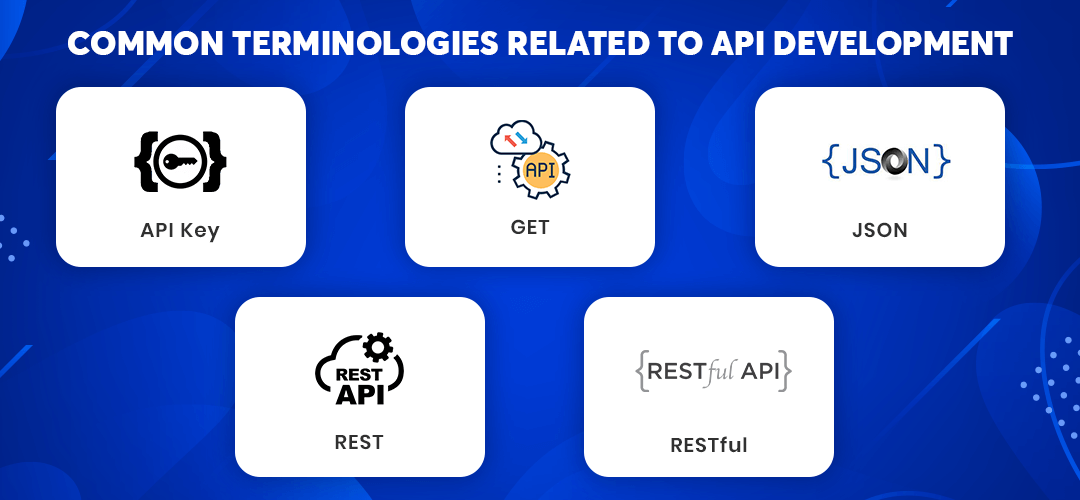
1. API Key
An API key is a unique identifier for an app or user. It helps in identifying the developer and also helps in optimizing the use of resources.
2. GET
GET is the most common way of retrieving information from an API. A GET request can be used by any client to fetch data present in the server.
3. JSON
It is a lightweight data-interchange format, mostly used by web APIs.
4. Endpoint
It is a web address that points to a specific API functionality.
5. REST
REST uses HTTP and HTTPS requests to communicate with APIs via URI endpoints.
6. RESTful
Representational State Transfer (REST) is an architectural style that provides a convenient and consistent approach to requesting and modifying.
Must-Have Features of an API
Below are some must-have features of an API that you need to know and implement in your API as well:
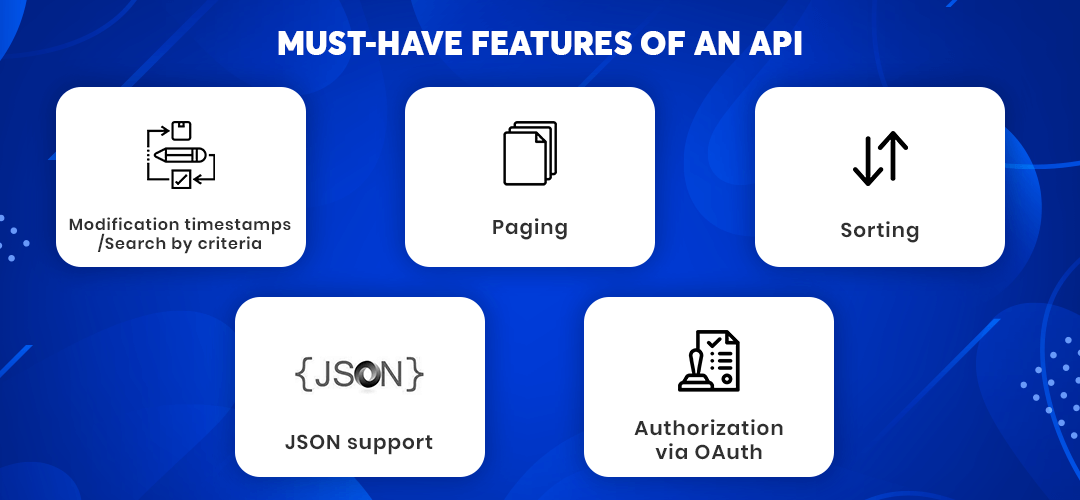
1. Modification timestamps/Search by criteria
It’s an important feature that lets users search data through different criteria like a date. It’s important to have a modification timestamps/search by criteria feature as the date and other similar parameters are dynamic and they have to be synchronized.
2. Paging
It often happens that the complete data change is not reflected and the API should calculate how much data to show at a single time. The paging feature does that and it also displays the number of pages of data remaining.
3. Sorting
By integrating the sorting feature, you can ensure that the user receives all pages of dates one at a time and not a bunch of pages at a single time.
4. JSON support
The API should have JSON support as it enhances the API’s performance by keeping it lightweight. It makes it easier to retry the upload on mobile apps if it fails due to any reason.
5. Authorization via OAuth
It’s important that your API authorizes through OAuth because it’s faster and much safer.
Tools to build an API
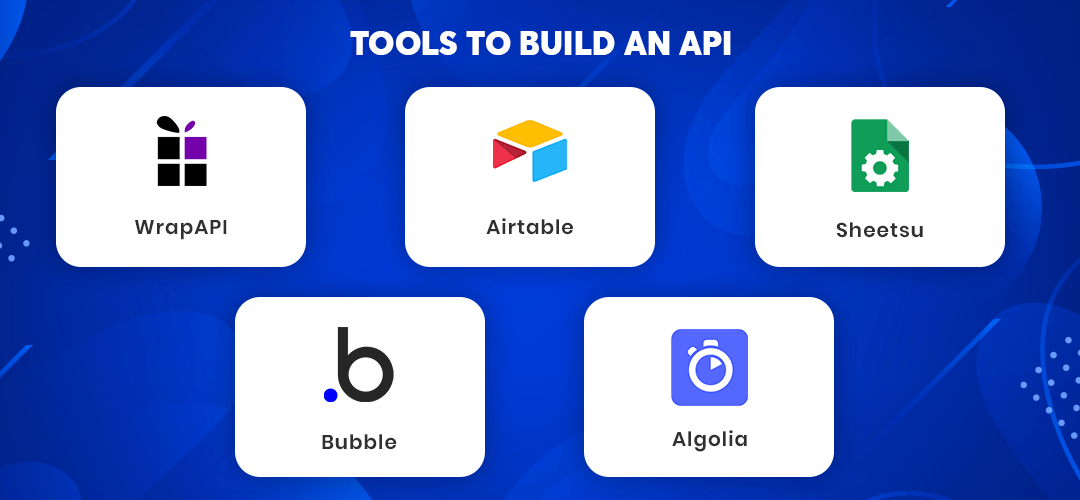
API (Application Programming Interface) Development Cost
The cost of API development depends on the functionality, complexity, and scalability of its userbase. Besides, it also depends on the location of development as developer charges vary geographically. For instance, the average expenditure to build a standard API in the following regions are:
- USA: $15,000 – $20,000
- Canada: $14,000 – $18,000
- India: $5,000 – $15,000
You can assume the API development cost between $5,000 to $20,000.
Why Choose Auxano Global Services for API Development?
API development is not a cakewalk. But you cannot omit APIs as they make your business competitive.
Trust the leading API development company, Auxano Global Services, in creating experiences that you wouldn’t have imagined.
Are you wondering what makes us the best technology partner for API development? Here are the reasons right below.
- We have years of experience in developing all types of APIs for numerous businesses.
- Our team has high-end proficiency in leveraging cutting-edge solutions in your state-of-the-art APIs.
- We follow a customer-oriented approach that helps us keep your requirements and objectives in the foreground during API development.
Wrapping up!
Avoiding copyright infringement and assimilating all tech stacks is the best way to develop a full-fledged and feature-rich API.
Over time, APIs have become highly advanced and are mushrooming into something more robust. However, challenges in API development are increasing. You need expert hands like Auxano Global Services to ace the API game in the blink of an eye.
Get started with Auxano Global Services for full-fledged API development and scale your business faster. We are a leading mobile app development company that takes care of all your requirements with perfection. Contact us today.
Frequently Asked Questions
-
1. What is an API?
Abbreviated as API, the Application Program Interface is a gateway that allows two apps to communicate between each other. APIs have several types viz WebSocket, Object Remoting, Class-Based, and so on.
-
2. Why are APIs so essential?
Nowadays, you can find almost all businesses harnessing APIs. These products are the best way to launch a technology-driven business. Apart from being cost-effective, the APIs can help you achieve a fast response time. All these reasons make APIs so essential for enterprises.
-
3. What are the must-have features of an API?
APIs are rich products and comprise a wide array of functionalities. Some of the must-have features in an API are paging, sorting, JSON support, and authorization (via OAuth).
-
4. How much does it cost to develop an API?
API development is one of the most sought-after projects these days. The exact cost to build an API depends on numerous factors like its functionality, complexity, scalability, and the developer’s location. You can expect to spend around $5,000 – $20,000 to develop a next-gen API.
-
5. Which is the best API development company?
Auxano Global Services is the best API development company. Our experts have years of experience in blending different technologies and creating the best APIs. Also, we are proficient in imparting the latest features like paging and sorting in your API. We combine all such understanding to bring the best for your venture when it comes to building an API. Get in touch with us now.

![API (Application Programming Interface) Development: A Comprehensive Guide [2022]](https://www.auxanoglobalservices.com/agsresources/wp-content/uploads/2021/11/API-Development-A-Complete-Step-by-Step-Guide.webp)

![How To Hire Remote Developers in 2021? [Complete Guide that 100% Help You]](https://www.auxanoglobalservices.com/agsresources/wp-content/uploads/2021/05/Front-Hiring-Remote-Workforce-or-Dedicated-Developers-in-2021.jpg)
